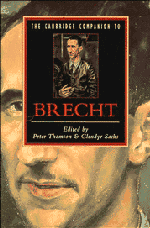Book contents
- Frontmatter
- PART 1 CONTEXT AND LIFE
- PART 2 THE PLAYS
- 3 Brecht's early plays
- 4 The Threepenny Opera
- 5 Brecht's clowns: Man is Man and after
- 6 Learning for a new society: the Lehrstück
- 7 Saint Joan of the Stockyards
- 8 The Zelda syndrome: Brecht and Elisabeth Hauptmann
- 9 The Good Person of Szechwan: discourse of a masquerade
- 10 Mother Courage and Her Children
- 11 Heavenly food denied: Life of Galileo
- 12 The Caucasian Chalk Circle: the view from Europe
- PART 3 THEORIES AND PRACTICES
- Bibliography
- Index of Works
- General Index
10 - Mother Courage and Her Children
from PART 2 - THE PLAYS
Published online by Cambridge University Press: 28 May 2006
- Frontmatter
- PART 1 CONTEXT AND LIFE
- PART 2 THE PLAYS
- 3 Brecht's early plays
- 4 The Threepenny Opera
- 5 Brecht's clowns: Man is Man and after
- 6 Learning for a new society: the Lehrstück
- 7 Saint Joan of the Stockyards
- 8 The Zelda syndrome: Brecht and Elisabeth Hauptmann
- 9 The Good Person of Szechwan: discourse of a masquerade
- 10 Mother Courage and Her Children
- 11 Heavenly food denied: Life of Galileo
- 12 The Caucasian Chalk Circle: the view from Europe
- PART 3 THEORIES AND PRACTICES
- Bibliography
- Index of Works
- General Index
Summary
Mother Courage and Her Children was written in 1938 and 1939 at a particularly difficult time for 'progressive' or 'radical' writers, especially those with affinities with the avant-garde of previous decades. Politically, in the face of rampant Nazism and fascism, Stalin had decreed that Communists must work for a 'popular front' of anti-fascist forces, which seemed to require artists to seek new forms of 'popular culture'. But in Soviet Russia, there was no such 'popular front', and the slightest deviation from the increasingly tortuous 'Party line' was being viciously stamped on. The Great Terror and the Show Trials silenced all dissent at home and left foreign well-wishers baffled.
Meanwhile, the Party's artistic line caused fearsome debate to rage about the nature of progressive, especially Communist, literature, and Brecht found his own ideas frequently denigrated and his work dismissed in circles where he ought to have felt welcome. The debate centred on notions of 'reality', and the writers' relationship to it.
- Type
- Chapter
- Information
- The Cambridge Companion to Brecht , pp. 128 - 138Publisher: Cambridge University PressPrint publication year: 1994
- 1
- Cited by

